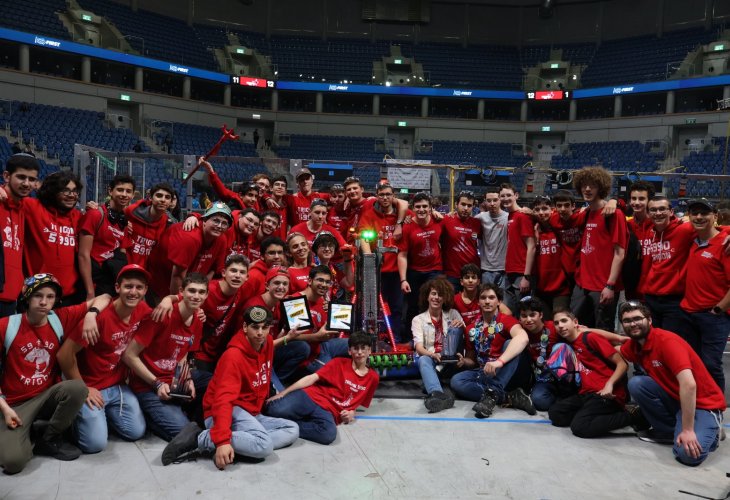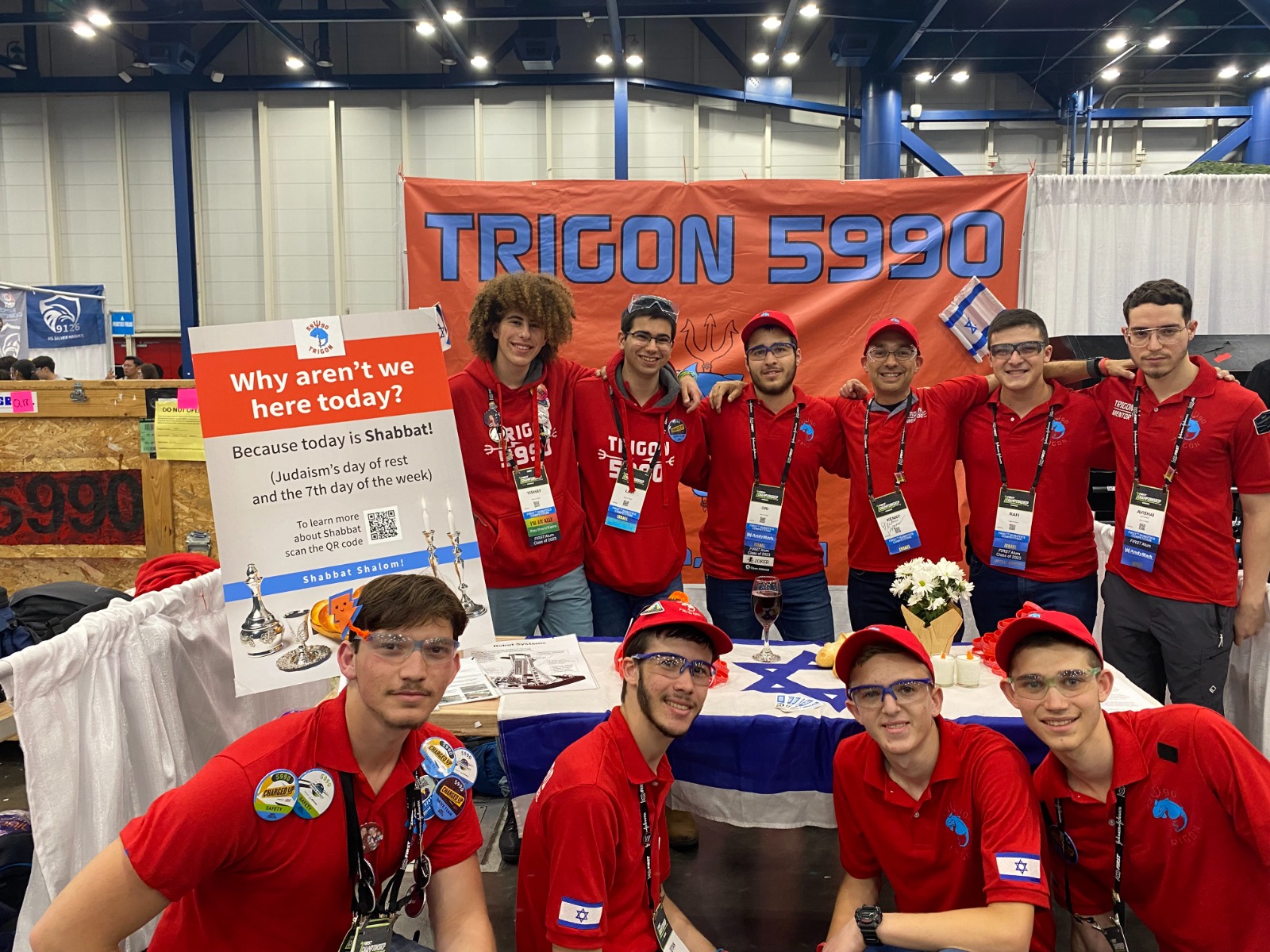The Team That Gave Up the World Robotics Competition for Shabbat: 'We Won Even Without Being Announced as Winners'
Students from AMIT Modi'in High School worked for months to participate in the world robotics competition finals in Texas, but at the crucial moment, they decided to give it up for Shabbat. In a special interview, three of the delegation members talk about their significant sacrifice and true victory.
 (Credit: TRIGON 5990)
(Credit: TRIGON 5990)For many months, a group of teenagers from AMIT Modi'in High School prepared for the world robotics competition (F.R.C) held in Houston, Texas. They overcame all the obstacles along the way and reached the final moments of the competition, making it to the grand finals. 'But then we decided to give it up,' Ophir Bar-On, one of the students with the Jewish bravery to forgo the big event, tells us—to honor the Shabbat queen.
'There is a large competition focusing on robotics,' explains Ophir, providing background on the ceremony where he and his peers sanctified Hashem's name. 'This is an international competition that draws teams from all over the world. No less than 3,000 teams compete, including 65 teams from Israel. We are the only religious group participating.'
'Through *siyata dishmaya*,' he continues, 'we managed to make it to the final stages of the competition and were invited to participate in the events in Texas, where 600 teams who passed the preliminary stages gather. It doesn't necessarily mean we won, but the mere invitation to Texas proves we're a strong team. Later, during the competition in the American state, there are several significant stages groups must pass to win in the finals.'
How does the competition work?
'The goal of the organization managing these competitions is to promote science and technology among youth,' Ophir explains. 'Every January, the organization sends a challenge to all teams simultaneously. This year, for example, the challenge was on electricity and innovation. The teams had to build a robot capable of placing cones on top of cubes by itself. Each team was tasked with building a robot the size of a washing machine that could perform the operation of setting cones on cubes.'
And why were you given the ticket to the competition in Texas?
'The competition begins with teams in each country separately,' he explains. 'There was a competition in Israel, during which we reached the finals. Although we lost by two points in the final part, the fact that we reached the finals allowed us to move on to the competition in Texas.'
Shabbat: A Competition Free Zone
'We knew the final competition would be held on Shabbat,' Ophir states. 'However, we chose to participate knowing we'd need to pause during the competition. The experience itself was important to us. Moreover, we wanted to convey a message about why we weren't participating and aimed to talk about Shabbat and us as a team. We had another almost unrealistic aspiration, but believed it was worth fighting for on behalf of future teams: to encourage the organization to avoid scheduling future competitions on Shabbat. We knew the chance of this happening was slim because the organization relies heavily on volunteers who are only available on Saturdays, but we decided to try anyway.'
'In practice, we were invited to compete in the finals, as mentioned, held on Shabbat. Together with us, there were three other teams with whom we collaborated. Each such group is called an 'alliance' — competing as one unit against other 'alliances' with the goal of winning. Early on, we informed the other two alliance members that we wouldn't be participating in the finals. We also submitted a letter to the event management, explaining our absence and requested the event manager to read our letter to the audience during the finals.'
 (Credit: TRIGON 5990)
(Credit: TRIGON 5990)Where did you spend Shabbat?
'We stayed at a hotel distant from the competition venue. We were unaware of what was happening during the competition throughout Shabbat. Even when discussions began in Israel, we were disconnected since Shabbat ends later in the U.S. But afterward, we heard it garnered significant interest, and the media covered it.'
Ultimately, what did you gain from the competition?
'Firstly, we gained extensive knowledge in technology, and alongside that, numerous memorable experiences throughout the competition. Additionally, we received an award for merely reaching a high stage. Also, our participation in the competition is anticipated to earn us favorable attention from the army and companies in the industry. And of course, above all: we sanctified Hashem’s name and observed Shabbat despite the challenge!'
'The Host Announced that Some Things are More Important than Robotics'
Ravit Bar-On, Ophir's mother and a member of the parents' committee of the team, participated in the students' trip abroad. 'It was very moving,' she shares her feelings about her son's and his friends' commitment for Shabbat, 'especially since it involves an international body that does many things.'
Regarding the organization hosting the competition, Ophir's mother says, 'They advocate helping others and promoting social issues. For example, these days, the robotics group is recruited to assist various projects due to the war. They perform shows for children who had to evacuate their homes and even helped army units operating these days in the Gaza Strip by enhancing the technological capabilities of the tools these forces use in Gaza. I cannot divulge more than that.
'Their social activity takes place even during regular times. Throughout the year, they assist a special needs children's institution and improve the games there to make them more accessible to the children.'
How did they manage to reach such a high level to allow them to participate in the world competition?
'They built the robot in seven weeks,' she answers. 'They achieved it after participating in several years of competition, and each year they improved until reaching the final competition. In preparation for this competition, they already knew they were on a very high level.'
And how did they accept the fact they couldn't participate in the finals?
'Naturally, it wasn't easy. There were discussions about whether it was permissible according to Jewish law to participate, and they were told it wasn’t allowed. Then, some suggested the team participate only as spectators, but after it was clarified that wasn’t permissible, everyone understood and accepted it. It's important to understand the difficulty they faced,' she emphasizes, 'an event of this magnitude and uniqueness. It’s enough to mention about 30,000 people gather under one roof. But Shabbat, of course, is much more special, and they didn’t think of compromising on it.'
Kenny Green also joined the trip to Texas. 'I am a member of the parents' committee and a sort of mentor for the team,' he says. 'From the first moment, it was clear that if we had the opportunity to get to compete in Texas — we would go, even if it meant not participating in the finals.'
'On the way, we considered several options, like giving the robot to non-Jews to compete with it for us, but we realized it wasn’t right and gave up.'
How were the feelings during Shabbat?
'There was great curiosity to know who won,' Ravit says. 'Ultimately, they gave it their all in the competition and proved themselves immensely. The subsequent publicity was important to them. In the end, I believe this overcoming challenge will grant them strength and resilience in life.'
As the students remained curious about the competition, the ceremony host stepped onto the stage and, at one of the highlights of the event, read the students' letter: 'We are a dedicated group of young people from Israel who worked hard to participate in the robotics competition. We come from a religious background, and our faith is an essential part of who we are. Shabbat is a special cornerstone in the Jewish tradition. On Shabbat, we disconnect and focus on our spiritual world, our families, our God, and our communities. Therefore, our team will neither be present nor participate in the competition. We invite you to visit our booth and learn more about Shabbat. We wish to thank FIRST for the opportunity to be here and bless all participating teams for making the event so inspiring for us, and we wish great success to all teams in the competition.'
The response was touching: thousands in the audience, team members from all over the world, stood up and applauded the courageous decision of the students. After the applause quieted down, the host concluded his remarks and said, 'Thank you Trigon (the team's nickname), for giving us an important reminder about the importance of things beyond robotics.'
To conclude, Kenny Green tells us: 'The competition manager said there are things more important in life than robotics. Even he understood it.'
How do you feel at the end of the day?
'Firstly, despite the difficulty, we managed to observe Shabbat,' Ophir says. 'Besides that, as mentioned, we won an important award, the Industrial Design Award, due to the uniqueness and capabilities of the robot we presented. I’ll note that a team that received an award never failed to make it to the finals, so this implies that our place in the final moments of the ceremony should have been assured.'
What reactions did you receive the day after?
'It was very moving to receive the surrounding feedback, to feel the widespread support of people for our step, and their pride in us. The fact that there was a group of religious kids who stood by their values despite the temptation doesn’t happen often, and it turned out it touched many people. Even other Israeli robotics teams, which are not religious, praised us for standing by our values. Who could understand better than them how bold of a step this was.'

